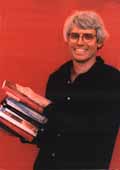AUSTRALIAN POETS AT WORK SERIES 1
John Kinsella
Selected by Coral Hull

[Above] Photo of John Kinsella by Wendy Kinsella, 1996.
CH: Do you believe in a power greater than yourself?
JK: Just about everything is greater than "myself", or the "self". I do not believe in the all-powerful righteous entity that sits in judgement over others, but I do believe in a "God" who is aware and connected to every particle of being, every action, thought etc. I have a holistic view of the universe, that every action will bring a reaction, or an alternate set of actions. The "butterfly effect", I guess. God, for me, can be interpreted as ethics, as a set of appropriate responses to these actions and reactions. Simone Weil said that "every separation is a link", and I've lived by this. All religions have something to offer, I can believe in the God of Christianity as much as the Gods of Hinduism, or the God of Islam or Judaism's Yahweh. They are modes of connecting with the Godhead, and I have respect for this. My veganism is tied up with my notion of God.
CH: What is your favourite animal and why?
JK: I identify with parrots and herons. Probably more the former because they are plant eaters. The 28 parrot really. I like their energy, and I have a lifelong association with them.
CH: Do you believe that art can transform the world?
JK: I believe it thinks it can. Maybe that's almost enough reason for it to exist.
CH: What advice do you have for young Australian poets?
JK: Don't take no for an answer. Listen to and read the work of others, but don't forget your 'own' voice. Think about the place you write from or in, but always think outside the envelope as well.
CH: What is your most memorable childhood incident?
JK: Encountering a "UFO" with my mother, and seeing it reported in the paper the following day. I was fascinated by the disjunction between the private and the public experience.
CH: When you look into a mirror, who do you see?
JK: A physical form that seems to belong to someone else. I can't ever fit my body with what's going on in my head.
CH: What is the hardest thing you've ever had to do?
JK: Before I was a vegan, I was on the farm checking gates at twilight -- driving back, I hit a ram and broke its neck. I 'had to' shoot it - it was dying. It was the last creature I ever shot. It changed my life. Everything about my decision and behaviour was wrong. The hardest thing was believing I 'had to'.
CH: What book of your own is your favourite and why?
JK: Night Parrots and Visitants - because they're a bit 'weird'.
| |
Crop Duster
It is the noun behind the action
that wrecks the choral work,
stiff breeze across drought-tweaked
ears of wheat charged with late rains,
aerofoils catching and sweeping
aquatic, harmonic exhalations
of scrub and pathways
that survey undulations; for here
the crop duster, sharp single-seater
with gull wings displaying,
ballet parody, stench of poison
imposing the shadow of a suppressive
kiss: cape tulip a legacy
on uncropped surface,
serial movements of emblematic parrots
escorting, switching at low-level
transfer stations, to bind the journey;
crop duster, aerial sprayer, farm-acology
mapped in the iris, as if seeing clouds
of spray billow out will necessarily
suggest a bitter odour, ingestion,
despite the wind blowing
in the opposite direction,
and we in our porous skins,
moving fast and further away.
Silver Eyes
Silver eyes annul fruit
of variety
and phraseology
so rapidly nothing
gets through this taut wiring,
the soft flesh of stone fruit,
in jam tree and York gum
georgic intensity -
a cumulative sound rips
air space, locality,
as declared pests outflank
like consciousness, avert
blank laws of property.
Willy Wagtail
Tacked down pat by heavy rain
a twitching tail absorbs refrains
of late season, and wheat ears
filling out to flesh the fields
bedraggled, purple flowers
suppressed and crushed
limply to their centres; but
the puff of a tiny chest
alert to pressure, switches
and swivels surveillance,
the sun behind the clouds
mirrored in its actions,
ungreyed by shelter,
its quick reaction
to imitation: we step out
chilled by reservations,
keen to shed our syllables, call
its actions models of behaviour.
Magpie Lark
Any incident will see
them reconnoitring;
not fringe or edge
or borderline, but alternate
plane of action. Linguistic birds,
their silence is the long pause,
what we might call
the philosophical disposition.
But that's it, only comparison,
allegories we contrive
for comfort, mid-sized bird
'almost like', complex
around flocks, the other bird
that's so familiar. |
About the Poet John Kinsella

|
John Kinsella is the author of more than twenty books whose many prizes and awards include a Young Australian Creative Fellowship from the former PM of Australia, Paul Keating, and senior Fellowships from the Literature Board of The Australia Council. He is the editor of the international literary journal Salt. He was appointed the Richard L Thomas Professor of Creative Writing at Kenyon College in the United States for 2001, and where he is now Professor of English. He is a Fellow of Churchill College, Cambridge University, and Adjunct Professor to Edith Cowan University, Western Australia. His selected poems and selected essays are forthcoming, as well as a new novel Post-Colonial and a book of short stories (co-authored with Tracy Ryan). John Kinsella is now the poetry critic for the Observer newspaper (London). |
[Above] Photo of John Kinsella by Wendy Kinsella, 1996.
I Next I
Back I
Exit I
Thylazine No.3 (March, 2001) |



